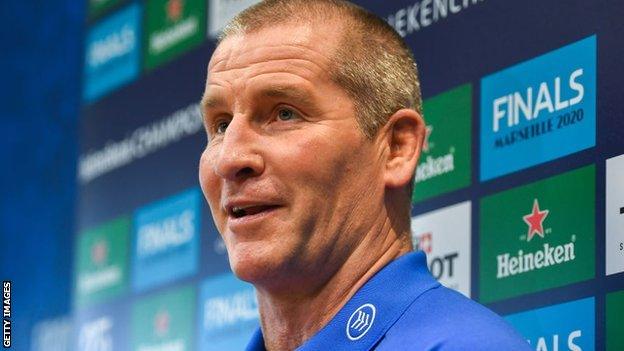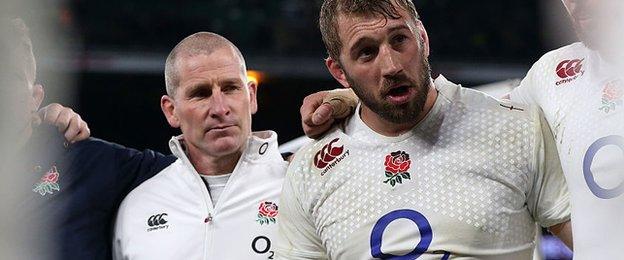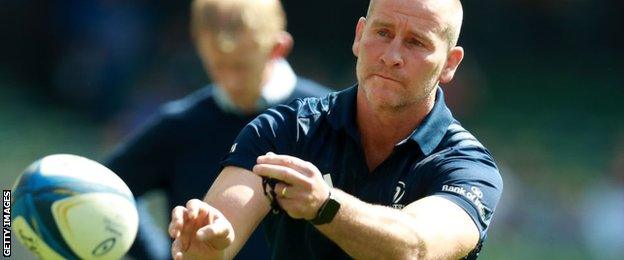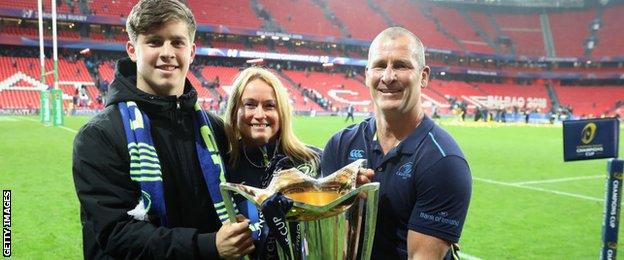Stuart Lancaster: Leinster redemption for former England coach
- Published
- comments

Stuart Lancaster worked with the Atlanta Falcons, British Cycling, the Football Association and New Zealand club side Counties Manukau during a year-long sabbatical following his England exit
In a famous scene in the 1994 epic The Shawshank Redemption, Andy Dufresne watches his fellow inmates sipping beers in the sunshine on the prison roof.
Dufresne had wrangled a couple of cold ones for a few of his pals in return for sorting out one of the guards' tax affairs. Dufresne himself didn't even drink; seeing his friends' joy was satisfaction enough. , external
This, according to Stuart Lancaster, is what coaching is all about.
"That's what drives you as a coach," says Lancaster. "Seeing the players have their moment. The beer in the changing room - that's the Holy Grail."
Now in his fourth season in Dublin, Lancaster has helped shape Leinster into one of the dominant club teams in world rugby. He has switched from being a number one to a number two, and returned to a hands-on tracksuit role. Four years on from the lowest point of his career, when he was sacked from his dream job with England, Lancaster has never seemed happier.
In a special episode of Rugby Union Weekly, the podcast was granted exclusive behind-the-scenes access to find out what makes the province - and Lancaster himself - tick.
Changing perceptions
Lancaster openly admits he didn't coach enough with England. Such were the demands of one of the most high-pressure jobs in the game, the bulk of his time was spent on management and leadership - rather than coaching on the training field.
When Eddie Jones took over at the end of 2015, Lancaster advised him to appoint a team manager to lighten the load, advice Jones heeded.

Lancaster and captain Chris Robshaw (right) oversaw England's pool-stage exit in their home Rugby World Cup in 2015
"It was 50% leadership, 40% management - or maybe the other way around - and 10% coaching," Lancaster explains. "Running the sessions would generally fall to the assistant coaches."
Does he wish he had done more hands-on coaching? "I do, for sure."
It's a different story at Leinster. As the senior coach to head coach Leo Cullen - who is responsible for the overall running of the province - Lancaster is given free rein to boss training, with his Tuesday - or 'Stuesday' sessions - the stuff of folklore in Dublin.
"When I finished with England and was on my trip around the southern hemisphere [in 2016] I spent a lot of time on my own, and went back to what really gets me out of bed in the morning," he says. "And I went back to coaching. My passion was that.
"Leo pretty much gives me license to run any meeting or training session the way I want and he would support my decision, in the same way I would 100% support him. So it is a genuine partnership."
'Stuesdays'
Rugby Union Weekly witnessed one of these high-intensity sessions, a few days before Leinster's routine win over Lyon in the Champions Cup.
"I would describe [the training] as mentally, emotionally, and physically challenging, with high levels of intensity and little rest," says Lancaster.
"The beauty of my role is I can spend the majority of my time thinking about how I can develop the next training session to be challenging and competitive."

Lancaster has returned to a more hands-on role with Leinster
With Leinster often providing the best part of 20 players to the national set-up during international windows, finding cohesion regardless of who is available is key. A conveyor belt of talent coming out of the province's schools means the Leinster Academy and Sub-Academy are stuffed full of players with the potential to step up when required.
"The international programme probably hits Leinster more than any team in the world," Lancaster adds.
"In training we have a high level of rotation, so everyone is up to speed with what we are doing, not prioritising the team who is playing at the weekend.
"No two sessions will ever be the same, because if you have the same sessions week-in-week-out players become bored."
'Irish players are more introverted'
Crossing the Irish Sea means a different rugby model and culture - and a different type of player.
"The Irish lads are more introverted than English lads would be generally," Lancaster says.
Leinster in Champions Cup since Lancaster's arrival | |
|---|---|
2016-17 | Semi-finals |
2017-18 | Winners |
2018-19 | Runners-up |
"More English players would be loud and extroverted. In England there is real diversity in the country in terms of personalities.
"But in Ireland the school system is very teacher-led and coach-led, and they are very used to being given the information and dealing with detail.
"It's not a strength all of the time, because sometimes I am trying to coax them out of that personality into a more extroverted personality who is happy to speak in a meeting. So it's about getting a balance.
"Someone like [former Leinster captain] Isa Nacewa was a blend, which made him such a great leader and the best leader I have worked with."
'The end point is to coach as long as possible'
Lancaster's chastening experience with England - "a scar that fades but never goes" - has taught him to live in the moment, and he is reluctant to look too far past Leinster when it comes to his next coaching role, especially with the province targeting epoch-defining success domestically and in Europe.
"The right next decision for me is important - and that might be to stay at Leinster for the next five years. And that wouldn't be a problem at all, I would probably love it," he adds.
"At a club like Leinster you are judged at the highest level by the best players.
"You have to be a very good coach to coach at Leinster because these players have been coached by great coaches, there are Lions players and international players aplenty. So if you don't know your stuff you won't survive here."
Now 50, his one desire is to "continue coaching as long as possible", citing the example of the revered coaching great Wayne Smith, who after head coach gigs with New Zealand and Northampton at the start of the century was entrenched in the All Blacks' backroom team from 2005 to 2017.

Lancaster celebrates Leinster's 2018 Champions Cup success with son Daniel - himself a player for Yorkshire Carnegie - and wife Nina
Whatever Lancaster's role, he will be striving towards those 'Andy Dufresne moments'.
"Someone once said to me that the players are the students and you are the professor, so you need to be one step ahead all of the time, so when the game is going on they have your voice in the back of their head.
"And that's the ultimate art of coaching I think, when you see that performance on the field, and you sit in the changing room afterwards with a beer, and a bit of music on, and you go 'that's what we were searching for'.
"In 2018 we had Isa Nacewa who was leaving us. [Before the Pro 14 final] I said to the players what drives us this week is to give Isa Nacewa his Andy Dufresne moment. That was the thing that stuck with the players.
"We beat Scarlets in the final and ended up back at the hotel and everyone is having a brilliant time.
"And out of the corner of my eye I saw Isa Nacewa stood by the side watching it unfold. It was such a special moment, and they are the things I love as a coach. Knowing we have done it together, but it is their moment."